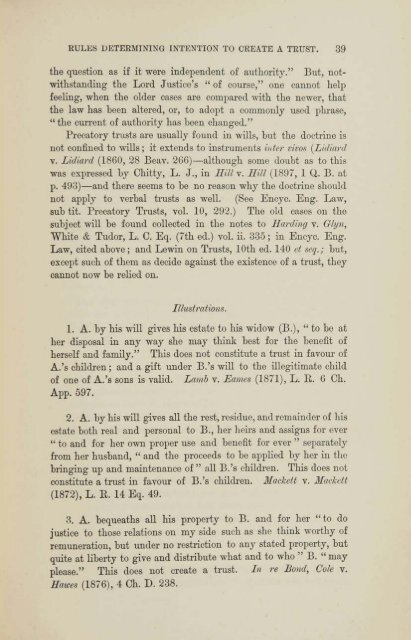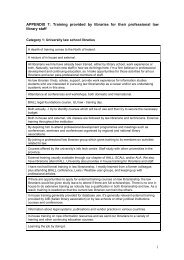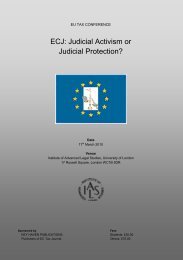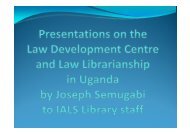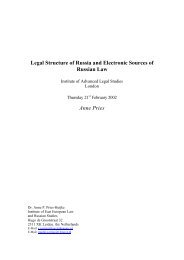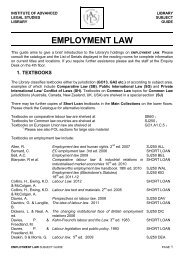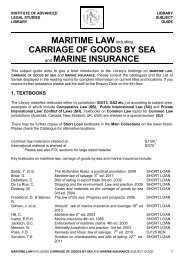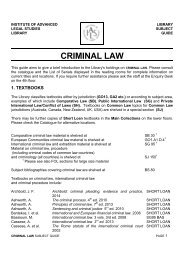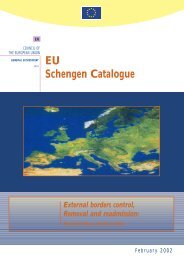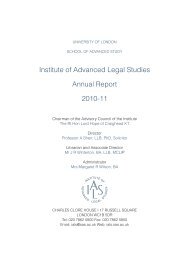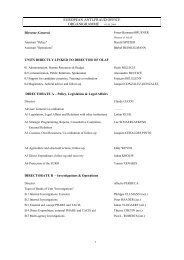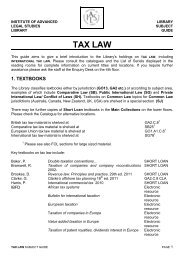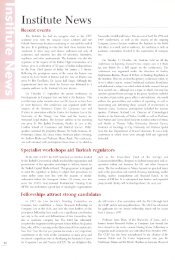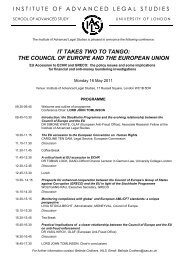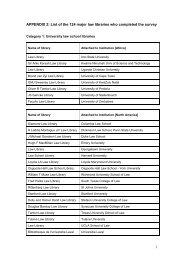a thesis - Institute of Advanced Legal Studies
a thesis - Institute of Advanced Legal Studies
a thesis - Institute of Advanced Legal Studies
You also want an ePaper? Increase the reach of your titles
YUMPU automatically turns print PDFs into web optimized ePapers that Google loves.
RULES DETERMINING INTENTION TO CREATE A TRUST. 39<br />
the question as if it were independent <strong>of</strong> authority." But, notwithstanding<br />
the Lord Justice's " <strong>of</strong> course," one cannot help<br />
feeling, when the older cases are compared with the newer, that<br />
the law has been altered, or, to adopt a commonly used phrase,<br />
" the current <strong>of</strong> authority has been changed."<br />
Precatory trusts are usually found in wills, but the doctrine is<br />
not confined to wills; it extends to instruments inter vivos (Lidiard<br />
v. Lidiard (1860, 28 Beav. 266)—although some doubt as to this<br />
was expressed by Chitty, L. J., in Hill v. Hill (1897, 1 Q. B. at<br />
p. 493)—and there seems to be no reason why the doctrine should<br />
not apply to verbal trusts as well. (See Encyc. Eng. Law,<br />
sub tit. Precatory Trusts, vol. 10, 292.) The old cases on the<br />
subject will be found collected in the notes to Harding v. Glyn,<br />
White & Tudor, L. C. Eq. (7th ed.) vol. ii. 335; in Encyc. Eng.<br />
Law, cited above; and Lewin on Trusts, 10th ed. 140 et seq.; but,<br />
except such <strong>of</strong> them as decide against the existence <strong>of</strong> a trust, they<br />
cannot now be relied on.<br />
Illustrations.<br />
1. A. by his will gives his estate to his widow (B.), " to be at<br />
her disposal in any way she may think best for the benefit <strong>of</strong><br />
herself and family." This does not constitute a trust in favour <strong>of</strong><br />
A.'s children; and a gift under B.'s will to the illegitimate child<br />
<strong>of</strong> one <strong>of</strong> A.'s sons is valid. Lamb v. Eames (1871), L. R. 6 Ch.<br />
App. 597.<br />
2. A. by his will gives all the rest, residue, and remainder <strong>of</strong> his<br />
estate both real and personal to B., her heirs and assigns for ever<br />
" to and for her own proper use and benefit for ever " separately<br />
from her husband, " and the proceeds to be applied by her in the<br />
bringing up and maintenance <strong>of</strong>" all B.'s children. This does not<br />
constitute a trust in favour <strong>of</strong> B.'s children. Mackett v. Mackett<br />
(1872), L. E. 14 Eq. 49.<br />
3. A. bequeaths all his property to B. and for her "to do<br />
justice to those relations on my side such as she think worthy <strong>of</strong><br />
remuneration, but under no restriction to any stated property, but<br />
quite at liberty to give and distribute what and to who " B. " may<br />
please." This does not create a trust. In re Bond, Cole v.<br />
Hawes (1876), 4 Ch. D. 238.


